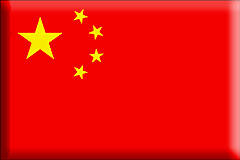Could China be a new cultural superpower?

Another profoundly idiotic, craven and predictable article by Martin Jacques in the Guardian about the inevitable and glorious rise of China gave birth to an interesting thought.
In contrast to five years ago, the likely identity of the next superpower has become crystal clear. It is no longer just a possibility that it will be China; on the contrary, the probability is extremely high, if not yet a racing certainty. Nor does the timescale of this change have us peering into the distant future as it did five years ago. China is already beginning to acquire some of the interests and motivations of a superpower, and even a little of the demeanour. Beijing feels like a parallel universe to the US, and certainly Europe. There is an expansive mood about the place. China is growing in self-confidence by the day.
And with good reason. There is no sign of China's economic growth abating, and it is this that lies behind its growing confidence. The massive contrasts between China and the US, both socially and economically, are enjoined in the argument over America's trade deficit with the China. The latter is deeply aware that its future prospects depend on the continuation of its economic growth and this remains its priority. But no longer to the exclusion of all else: China is beginning to widen its range of concerns and interests.
So far so predictable: China is growing at an exponential rate and is beginning to challenge the global power of the US. My idea concerns this parallel between Chinese and American power, but at the level of culture.
It's clear that the US as a global cultural superpower foments opposition to itself by crushing or buying off any attempts at cultural independence, so that you increasingly see the same films advertised at the same time in the centres of cities all around the globe, for example, and so many people's free time is spent watching films from Blockbuster video, not to mention eating at McDonalds and shopping at Wal-Mart and so on. This makes the United States a very obvious target for anger against injustice and inequality.
China, on the other hand, has almost no cultural influence on this level, give or take the occasional martial arts epic, which is itself effectively a product of the Hollywood system. There are no global Chinese music stars, and very few if any recent global household names in any field. There is, thankfully, no global Chinese equivalent to McDonalds or Pizza Hut; in fact, the brands most beloved of young Chinese people seem to be American or European ones - NBA, KFC, the Champions' League etc. Aside from a few satellite Chinese speaking parts of the world, China has little or virtually no cultural influence to match its growing economic clout.
Doesn't this mean, then, that its increasing international economic power will attract less notice and therefore less opposition? I'm thinking in terms of other developing countries, specifically Africa, the Middle East and South America, where the locally damaging effects of China's involvement are becoming more and more unavoidable (I wrote about some aspects of this here), as well as the catastrophic effects on the environment if every Chinese peasant did ever get to live the Chinese Dream. What China lacks, though, is anything like the very clear focus for opprobrium that US cultural products and brands represent.
I don't know if there will come a point where China will need to start marketing its cultural products to a non-Chinese audience. There is certainly a long way to go before the country that brings us CCTV will be able to produce convincing English language films, for example. But I don't think in fifty years' time we'll all be speaking Mandarin either, as China Outside China - the current expansion, rather than the results of past emigration - is very much an English-speaking project. I'm just interested in what happens when, as we're beginning to see now in some African countries, political opposition to Chinese economic influence starts to deepen and widen. What form will it take? Will people just turn on their local Chinese shopkeepers, as has happened a few times in Indonesia in the last couple of years?
Many young people around the world grow up hating McDonalds and Tom Cruise's face almost by instinct, on their way to developing more informed and complex oppositional ideas about the world. Certain faces and symbols have come to represent the worst excesses of American power. Will there come a point at which individual symbols and faces represent what we hate and fear about the economic power of China? Or will we at some point start to witness a reaction that targets Chinese people, rather than the symbols that have, whether they like it or not, come to represent them?
One of the comments posted in the discussion following the Martin Jacques piece stated baldly 'The Chinese have little regard for freedom, justice or human life for that matter.' Not, it should be noted, the Chinese Government, but The Chinese themselves. I have a feeling that five, ten or twenty years from now this kind of racist attitude will be commonplace - and it will come as quite a comfort to the Chinese Government, which would far rather see the anger of the world at its expansionist policies targeted at the Chinese people rather than at itself.